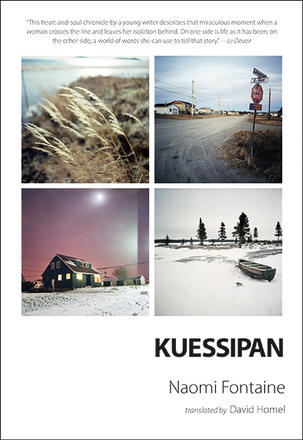
Kuessipan
Description
A fictionalized, meditative chronicle of life among the Innu in rural northeastern Quebec.
Kuessipan ("to you" in the Innu language) is an extraordinary, meditative novel about life among the Native Innu people in the wilds of northeastern Quebec. Naomi Fontaine, herself an Innu, wrote this novel (in French) at the age of twenty-three; with grace and perfect pitch, she depicts a community of nomadic hunters and fishers, and of hard-working mothers and their children, enduring a harsh, sometimes cruel reality with quiet dignity. Pervading the book is a palpable sense of place and time played out as a series of moments: elders who watch their kin grow up before their eyes; couples engaged in domestic crises, and young people undone by alcohol; caribou-skin drums that bring residents to their feet; and lives spent along a bay that reflects the beauty of the earth and the universal truth that life is a fleeting puzzle whose pieces must be put together before it can be fully lived.
With poetic restraint and a documentary-like eye, Kuessipan is a remarkable and intimate portrait of a world that reads like no other.
Kuessipan is currently being developed into a French-language motion picture by director Myriam Verreault for Max Films Inc.
If you keep on going, there will be sand beneath your feet. You'll taste the salty air. The sun will start to go down. The sky will put on a show. Let the waves give rhythm to your senses. You will be comforted. Just walk through those spruce trees. Then you'll see the bay, the beach with its soft sand, the aluminum smelter, the islands, the river as wide as the sea. The ocean, where you came from.
Reviews
A fascinating, complex portrait of life on Innu First Nation's reserve in Canada. -Bustle
Fontaine's layered images of Innu life are full of human depth, including also struggle, pride, joy, and love. It is not a romanticized view, but contextualized, with an intelligence that keeps the story engaging . .. In the end, it is a story of strength and of hope, which are intimately entwined. -Montreal Review of Books
This heart-and-soul chronicle by a young writer describes that miraculous moment when a woman crosses the line and leaves her isolation behind. On one side is life as it has been; on the other side, a world of words she can use to tell that story . .. [Naomi Fontaine] writes in the same tradition as Native writers such as Tomson Highway, Thomas King, and even Louise Erdrich. -Le Devoir
The writing is both incredibly simple and effectively poetic, illustrating James Wood's observation above that, in fiction, brevity takes us closer to poetry . .. Kuessipan is a beautiful book. Beautiful language, beautifully translated. -Ambos
With this debut book, Naomi Fontaine, a member of the Innu First Nation, has delicately crafted a series of miniature masterpieces - of moments, places and emotions . .. What she does so admirably, without pathos or angst, is reveal a community of souls - mothers, grandfathers, errant boyfriends, pregnant girls - trapped in a way of life out of sync with their past and on a crash course with their present. -The Rover
Fontaine's chosen style presents us with a tableau of people, while at the same time getting behind that and delivering intimacy and empathy on an individual level. Her work expresses the idea of hope and rebirth in a culture that continues to struggle for dignity and identity. -Broken Pencil
David Homel's translation is graceful and precise, allowing Kuessipan's poetic language and phrasing to show through. But this poetry doesn't romanticize; rather, it lends a poignant beauty to difficult subjects, calling not so much for empathy as for an honest regard. This is a book of crisis and a book of longing, but ultimately a book of hope for the future. -Canadian Notes and Queries